Top Employee Benefits: Key Findings
- 43% of hospitality workers have access to paid vacation — lower than tech (60%) and finance (95%) workers.
- Hospitality workers typically get just 6 paid vacation days after one year of service.
- Flexible schedules boost focus by 64% and productivity by 39%.
After months of applying and interviewing, you’ve finally received a job offer.
While a higher salary is exciting, don’t overlook the employee benefits and perks you can negotiate. This article covers what to ask for beyond pay and how to approach the conversation to set yourself up for long-term success.
Employee Benefits To Negotiate Other Than Salary
Employee benefits and perks are particularly important for fast-paced sectors like hospitality.
Considering its physically demanding nature, irregular working hours and dynamic settings, negotiating benefits to prevent burnout is important.
Reviewing these 22 things to negotiate other than salary below will help you identify what will keep you motivated to work in this industry.
1. Flexible Work Schedule
A flexible work schedule allows you to adjust your hours to fit your personal and family needs.
Beyond convenience, a flexible schedule can make you more productive and satisfied with your job.
When you can plan and do your work during the times you're most alert and focused, it will lead to increased efficiency and a greater sense of accomplishment.
Employees with flexible schedules reported a 39% increase in productivity and 64% stronger focus compared to those with rigid schedules, according to the Future Forum Pulse survey.
2. Vacation Time
A generous vacation policy helps you handle the stress of your job effectively and create a more balanced and fulfilling life outside of work.
This is especially true in the hospitality industry, where long shifts and high-pressure environments are common.
In fact, hospitality workers typically get six paid vacation days after a year of service.
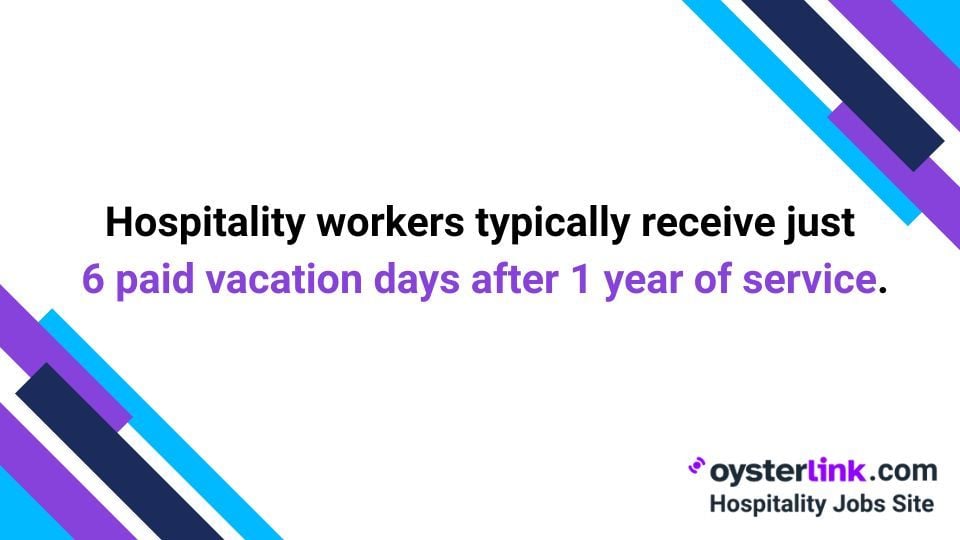
If the standard vacation offer doesn’t meet your needs, consider negotiating for more time off by:
- Researching norms and laws: Check what similar companies offer and whether your state has mandatory paid leave — this strengthens your case.
- Framing it around performance: Show how extra time off supports your well-being, leading to better work and longer retention.
- Offering flexibility: Suggest taking leave during slower periods or covering holiday shifts in exchange for more PTO.
- Proposing milestones: Ask for more days off after six months or a year, or as a reward for meeting performance goals.
- Negotiating eligibility: Request a shorter waiting period before you can start using your vacation time.
3. Paid Time Off
Vacation time and paid time off (PTO) differ in their scope.
Vacation is a subset of PTO, while PTO covers various forms of time away from work.
It includes the following:
- Sick leave: A leave employees take for health reasons
- Personal day: A leave intended for short-term and immediate needs, such as special occasions, personal appointments and emergencies
- Parental leave: A leave employees take to care for a newborn, adopted or foster child
- Caretaker leave: A leave employees take to provide care and support for a family member who is ill, disabled or requires assistance
- Bereavement leave: A leave granted to employees following the death of a close family member or a loved one.
Unfortunately, the majority of hospitality workers aren’t provided with enough PTO.
In comparison to employees in the finance (95%) and tech (60%) industries, hospitality workers have the least access to paid vacation at 43%.
Having these relevant industry benchmarks will help you negotiate with your potential employer.
Here is an example script of how you can negotiate for more PTO:
“Given the statistics for paid leaves in the hospitality industry, I am eager to discuss the possibility of aligning the benefits package more closely with other industries. I believe this adjustment would not only contribute to employee satisfaction but also enhance the overall well-being and productivity of the team.”
4. Relocation Stipend
This is a fixed sum of money given by an employer to help cover moving costs related to the job. After all, moving for work can be expensive, and negotiating a relocation package can ease the financial burden, making the transition smoother.
There are many different kinds of relocation stipends but here are the most common options:
Lump Sum
This relocation package involves a company giving an employee a fixed amount of cash to assist with moving expenses.
The employee decides how to use the funds, whether for hiring a moving service, transportation or other necessary costs.
Ideal for: Those who prefer flexibility in managing their relocation costs.
Reimbursement
In this setup, the employee pays for all moving costs first.
The employer later gives them money back, either in full or up to a certain limit.
Ideal for: Employees with enough savings to front relocation expenses.
Third-Party Relocation
In this arrangement, a company hires an external service to assist employees in finding moving services, transportation and storage options.
The employer covers all the expenses associated with this third party.
Ideal for: Those who prefer a hassle-free, employer-managed relocation process.
Expatriation Assistance
Expatriation assistance is provided to employees moving to a different country.
This support includes moving costs, work visas and other needs for adjusting to a new country.
Ideal for: Employees moving internationally who need assistance beyond standard moving expenses.
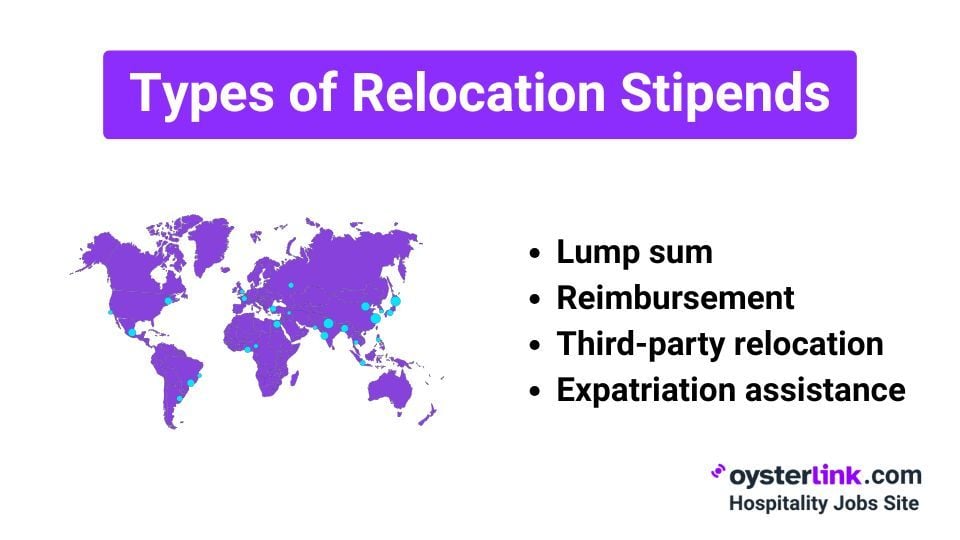
5. Dental Benefits
In customer-oriented jobs, having good oral health is essential for a professional appearance.
Small companies, restaurants and hotels aren’t obligated to provide this benefit.
But it's worth asking about, as dental benefits can lead to cost savings by lowering out-of-pocket expenses for dental procedures.
See also: 35 Crucial Questions To Ask Before Accepting a Job Offer
6. Childcare Budget
This benefit helps working parents with the costs of childcare services. Common types of childcare support include covering daycare expenses, offering access to trusted childcare providers, or allocating space for childcare in the workplace.
Having childcare benefits eases the financial strain of child-related expenses for employees, allowing them to better balance work and family responsibilities.
Childcare benefits can generate up to 425% ROI —for every dollar spent, companies may see $4.25 back through improved productivity, retention and employee engagement.
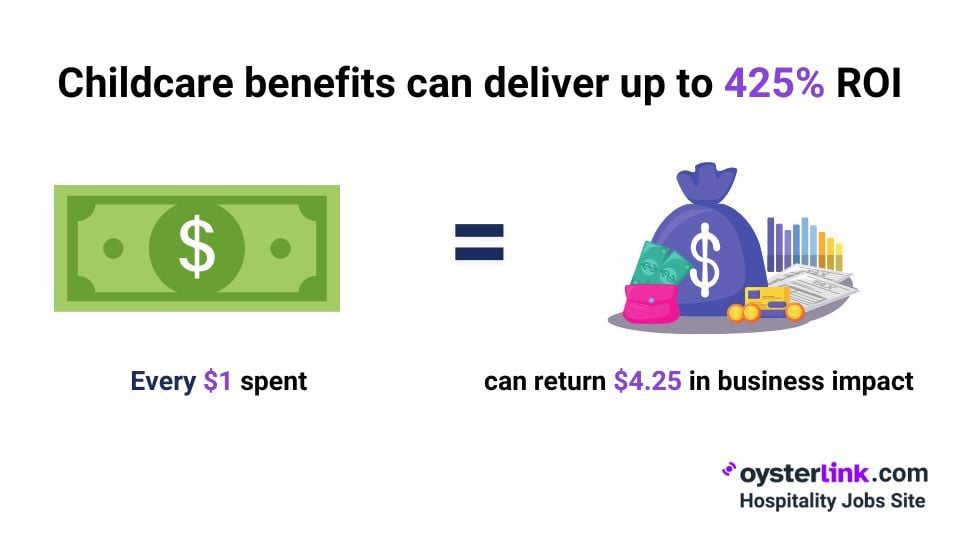
7. Professional Development Budget
This benefit aims to invest in the growth and skills enhancement of employees.
Professional development budget enables employees to pursue relevant training, certifications and workshops that align with their career trajectory. It can cover a variety of learning opportunities, such as:
- Industry certifications: Obtaining certifications relevant to your profession (e.g., ServSafe for hospitality workers) can improve your qualifications and open doors to better job prospects.
- Continuing education: Some employers may reimburse tuition costs for relevant coursework, whether through online classes, college programs or professional schools.
- In-house mentorship and coaching: Beyond formal education, some companies fund mentorship programs, leadership coaching or access to professional networks to support career advancement.
- Conferences and networking events: Attending industry conferences or networking events can provide valuable insights, help build connections and keep you updated on the latest trends.
Negotiating for this benefit ensures that you have the resources to grow within your field, making you a more competitive candidate in a rapidly evolving job market.
Before accepting an offer, ask about available learning opportunities or propose a set PD budget tailored to your career goals.
This video gives you data to reference when negotiating support for your continued growth.
8. Educational Opportunities
While related to the professional development budget, educational opportunities differ by focusing on formal academic programs.
For example, as a Restaurant Manager, you can explore degree programs in financial management to learn more about budgeting, cost control and financial analysis.
Your employer may choose to provide tuition reimbursement for the costs associated with pursuing this academic program.
Other companies collaborate with academic institutions to support their employees’ continuing education for both personal and professional development.
Be proactive in exploring and utilizing such opportunities to enhance your skills and advance in your career.
9. Retirement Plans
This financial arrangement helps you save and invest for your retirement years.
It typically involves contributing a portion of your earnings to dedicated retirement accounts, such as a 401(k), which may be supplemented by employer matching contributions.
A retirement plan provides financial security and support during your retirement.
10. Life Insurance Plans
According to the latest government data for the United States in 2024, fatalities in the leisure and hospitality sector increased by 23% from 2021 to 2022.

This highlights the significance of negotiating a life insurance plan to safeguard your future and provide for your dependents.
11. Disability Insurance
This employee benefit replaces a portion of your income if you can’t work because of an injury.
Securing this insurance is important as it covers your living expenses, medical bills and other financial commitments in case you are unable to work due to an accident or illness.
12. Transportation Reimbursements
This covers costs like public transportation, fuel or parking.
It is valuable for roles that require frequent commuting. For instance, being an Event Planner means visiting venues, meeting with clients and managing logistics.
See also: 9 Reasons You’re Getting Interviews but No Offers
13. Equity Compensation Package
This is a type of reward that includes ownership stakes in a company. An equity compensation package is usually given in the form of stocks, stock options or performance shares. It can be a valuable addition to your financial portfolio, providing gains as the company succeeds. For a deeper look at how equity works in practice, check out this TikTok video.
14. Pet Allowance
According to Forbes Advisor, the cost of dog expenses accounts for an average of $1,533 a year. This only covers pet boarding, veterinary care and pet insurance.
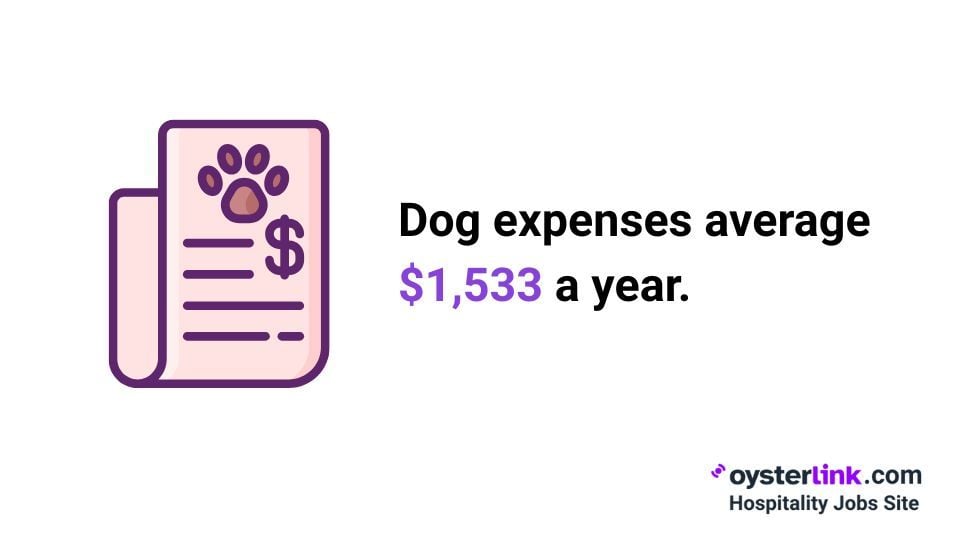
Negotiating for this benefit can significantly ease the financial load for pet owners.
15. Career Growth Opportunities
If you aspire to transition to a higher position, inquire about career growth opportunities during negotiations.
For example, if you’re a Front Desk Associate aiming for a Front Office Manager position, ask about available training, mentorship and advancement programs within the company.
This proactive approach helps you secure a clear path for advancement within the company.
Access to career growth opportunities contributes to higher job satisfaction, as you feel supported in your career aspirations and have the chance to continually grow.
16. Travel Options
Travel benefits packages typically offer discounts or reimbursements for personal travel-related expenses like flights, accommodation and transportation.
Negotiating these benefits can help you save a substantial amount on your travel costs.
See also: 15 Best Skills to Put On a Resume
17. Discounts on Company Products or Services
This perk lets you enjoy your employer's products or services at a lower cost, giving you a real financial advantage.
For instance, if you work in a hotel or resort, negotiating for discounts could mean getting lower rates on room bookings, dining services or other amenities.
It's a practical and attractive benefit that aligns your interests with the offerings of the company.
18. Signing Bonus
A signing bonus is an amount of extra money that an employer gives you when you sign an employment contract for a new position.
If you're joining as a manager or an executive who'll be in charge of multiple team members, a signing bonus is one way that employers can incentivize you to sign with them and not their competitors.
Employers can also offer a sign-on bonus to new hires as a way to make up for any benefits they may lose when they leave their old jobs.
This video explains how sign-on bonuses work and what to watch out for before accepting one.
19. Remote Work
Working remotely has dozens of benefits that can save you substantial time, money and flexibility, especially if your commute to work is longer than an hour.
Since the pandemic, remote work has become an increasingly more popular benefit that employees are asking of their employers. Even if you're not able to negotiate on the dollar amount of your salary, you might be able to save some money by working remotely and not spending extra money on gas or bus/subway tickets.
Additionally, keep in mind that most employers allow a hybrid setup nowadays. What this means is that you can spend one or two days working from home, and go to the office the remaining days. Many employees prefer this setup because it gives them a better work-life balance.
20. A Better Job Title
A job title may seem minor, but it’s one of the smartest things to negotiate beyond salary.
It can impact your resume, LinkedIn visibility and future career prospects. If your duties reflect a more senior role, ask for a title that matches—without requesting a salary bump.
For example, if you’re doing Event Manager work as an Event Coordinator, a title change can better reflect your experience.
Below are some additional tips to help you in preparing to negotiate your job title.
- Compare the offer to industry standards: Research job titles for similar roles at other companies in your industry. Use job boards like OysterLink and salary comparison sites to see if the offered title matches the responsibilities outlined in the job description. If the title seems lower than expected, it is likely worth negotiating.
- Clarify role expectations: Before signing the offer, ask for a detailed job description. Ensure the title accurately reflects the scope of work. If you're expected to take on leadership, strategic planning or additional responsibilities beyond what the title implies, you should request an adjustment.
- Use competing offers as leverage: If you have multiple job offers, compare titles and responsibilities. A higher-ranking title elsewhere can serve as leverage in negotiations, giving you a stronger case to ask for an adjustment.
- Align with organizational structure: Understand your company's hierarchy and existing title conventions. Propose a title that fits seamlessly within this structure to facilitate approval and maintain internal consistency.
- Tie the title to future growth: If the employer is hesitant to adjust your job title immediately, ask if a title change can be built into your offer letter after a set probationary period or performance review. This ensures a clear path for recognition and career advancement.
- Frame it as a win-win: When requesting a title adjustment, highlight how it benefits both you and the company. A more accurate title can attract higher-caliber candidates in future hiring rounds and better position you to represent the company externally.
This video offers helpful context on when negotiating for a job title makes sense — and when it might be better to hold off.
21. Severance Package
A severance package consists of benefits that an employer may offer to an employee when their employment is terminated, typically through no fault of the employee. In many cases, this includes a lump-sum payment, continued health insurance for an extended period of time, unused vacation pay or even outplacement services.
It's important to negotiate a severance package because it can provide you with financial security during a period of unemployment and can soften the blow of losing a job. Most large companies have some sort of severance packages in place, though a lot of them reserve them for higher-level or long-term employees.
22. Better Office Space
Having a comfortable and well-organized workspace can significantly boost your productivity. When discussing job terms, it's worth asking about your work setup. You could negotiate for an office rather than a cubicle, a more spacious area or even a spot with a nice view.
What Are Employee Benefits?
Employee benefits are perks or advantages provided to employees beyond their base salaries.
These perks aim to promote employee well-being and attract and retain top talent.
A study supports this, with 53% of employees saying that benefits play a significant role in their job satisfaction.
Why Employee Benefits Are 100% Worth Negotiating
Negotiating beyond salary can feel challenging, but it’s a key step toward a better job offer.
Benefits like financial security, work-life balance, career growth and family support are all worth discussing. Treat it as a normal, constructive conversation to align your needs with the employer’s — and build a package that fits your life and goals.
Subscribe to OysterLink for More Career Advice
As you can see, OysterLink goes beyond just being a job search platform — we're also here to help you build a successful hospitality career.
Here, we have an extensive knowledge base offering career advice, including steps on how to write a CV, advice regarding the best skills to put on a resume and tips for negotiating a salary.
Looking for your next opportunity? Try out our job search tool below to start finding hospitality roles that match your skills and career goals.
Sign up today and take the next step in your career with confidence!
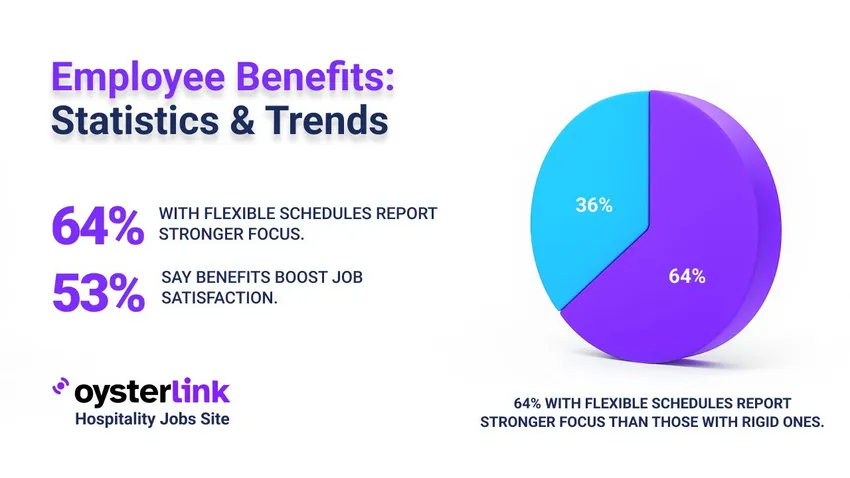









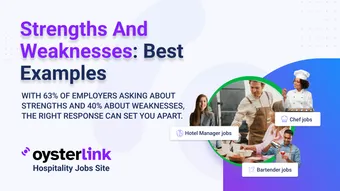
Loading comments...